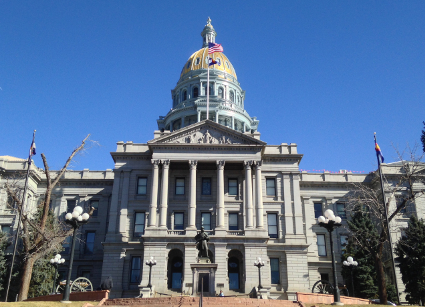By Jeffrey A. Roberts
CFOIC Executive Director
Groups representing Colorado journalists and citizen requesters of public records are voicing concerns about a legislative proposal to resolve records disputes through mediation.
Although generally in favor of some kind of alternative to litigation for challenging denials of public records, they’ve concluded that HB 17-1177, without substantial revisions, would create additional impediments for people seeking government information under the Colorado Open Records Act (CORA).
Both the Colorado Press Association and the Colorado Broadcasters Association oppose the bill as introduced by Reps. Cole Wist, R-Centennial, and Alec Garnett, D-Denver, as do Colorado Ethics Watch and Colorado Common Cause. All four organizations participated in the CORA Working Group, a stakeholders’ committee that discussed litigation alternatives last year but did not recommend a specific proposal.
Wist also participated in the CORA Working Group, which came up with a separate bill on digitized public records. In an interview earlier this month, Wist told the Colorado Freedom of Information Coalition the goal of HB 17-1177 is to encourage both requesters and government entities to resolve CORA disputes outside of the court system. Litigation currently is the only remedy in the open-records law.
 “I’m trying to create incentives for parties to resolve cases without suing,” Wist said. “I hope that people never have to sue to gain access to public records, period.”
“I’m trying to create incentives for parties to resolve cases without suing,” Wist said. “I hope that people never have to sue to gain access to public records, period.”
But Peg Perl, senior counsel for Colorado Ethics Watch, said the bill seems to presume that CORA disputes often wind up in court when, in fact, there aren’t a lot of open-records lawsuits in Colorado. What frequently happens, she said, is that records requesters just give up when they think a denial is improper because suing can be expensive and intimidating.
“The number one goal of citizens making requests is to get the actual documents and to get them in a timely manner,” she said. “To the extent that we favor some sort of mediation or ombudsman, it’s to facilitate disputes so that citizens or organizations get access to records. It’s not about getting fines or punishing the government or getting huge attorney-fee awards.”
Requesters worry that HB 17-1177 will let government entities drag out the CORA process, if they want, because the bill doesn’t specify a timeline for bringing mediation. It also doesn’t set any limits on the cost of participating in mediation, only stating that requesters and custodians would split the cost evenly.
Although the bill would penalize both sides for not participating in mediation, Perl said the measure ignores the reality that records requesters and records custodians are not on equal footing when a dispute arises. Unlike the government, she said, “the citizen has no access to the records, no access to the attorney general or another government attorney, no power to negotiate … The custodian is holding all the cards.”
If a requester doesn’t participate in mediation but prevails in a lawsuit, HB 17-1177 would limit the amount of court costs and attorney fees that he or she can be awarded. It also establishes a penalty for records custodians who refuse to mediate and end up losing in court.
If the parties mediate but can’t resolve a dispute without court action, the bill would entitle a prevailing requester to mediation costs, court costs and attorney fees. But if, after a failed mediation, a court finds that a denial of records was proper, the records custodian could be awarded court costs and reasonable attorney fees.
The proposal also bars the awarding of court costs and attorney fees to records requesters in any action initiated by a custodian who claims that disclosure would “cause substantial injury to the public interest.”
Wist said both parties “should have some skin in the game.” But Steve Zansberg, an attorney who represents the press and broadcasters associations, said the bill “imposes significant penalties on records requesters who do end up in court, whether after mediating or not, that effectively deny citizens their right to challenge records denials without having to mortgage their homes.”
Russell Weisfield, an open-government advocate who sued Arvada in 2014 over the city council’s use of secret ballots, said he never would have brought that Sunshine Law case if he risked being held liable for the government’s legal costs. (Under both the Sunshine Law and CORA, as currently written, governments can recover court costs and attorney fees only if a lawsuit is found to be “frivolous, vexatious or groundless.”)
“The potential costs would have been more than overwhelming!” Weisfield wrote in an email to Wist and the CFOIC. “… Faced with such a possible fate, I would have instead not challenged the government and sued.
“In other words, this bill would have the effect of making government more opaque, not transparent.”
Zansberg, who also serves as CFOIC president, said both media associations appreciate the bill sponsors’ commitment to creating “another path for resolving CORA disputes and we are continuing to discuss possible alternatives with them.”
Although the associations can’t support HB 17-117 as introduced, he said they “fully support efforts to facilitate alternative means to quickly and cheaply resolve public records disputes so ordinary citizens need not hire a lawyer to go up against the Colorado attorney general or a county attorney in court.”
Elena Nunez, executive director of Colorado Common Cause, said her organization also would like to see ways to resolve CORA disputes without litigation. But HB 17-1177, she said, “will make it more difficult to access public records, the opposite of what we should be trying to achieve.”
A hearing on the bill is scheduled for Thursday in the House State, Veterans and Military Affairs Committee, but it likely will be delayed to give the sponsors more time to work on possible amendments.
Follow the Colorado Freedom of Information Coalition on Twitter @CoFOIC. Like CFOIC’s Facebook page. Do you appreciate the information and resources provided by CFOIC? Please consider making a tax-deductible donation.




